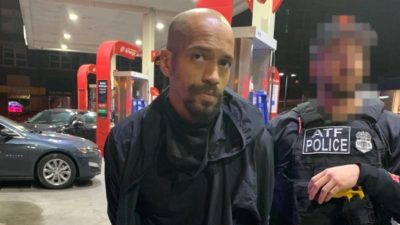(3-23-22) It’s happened again. This time, two are dead and three others wounded. All homeless men. All brutally attacked.
Gerald Brevard III, a 31 year-old Washington D.C. resident, with a long history of mental illness, has been charged with killing Morgan Holmes, 54, who was found shot and stabbed in his tent, which was set on fire, on March 9th in the nation’s capital. Brevard is a suspect in another murder in New York City that happened several hours later and three other shootings of homeless men.
As almost always in killings that involve a suspect with a diagnosed serious mental illness, there were plenty of red flags that were ignored.
“He is a good person and like many across the world, he suffers from mental illness,” Brevard’s father, Gerald Brevard Jr., told local Washington NBC News4 reporter Shomari Stone. “The bigger picture is not that he has mental illness, but the number of times that he’s been within the judicial system and how the system has failed regarding the treatment of so many, including my son.”
The senior Brevard is right. The most recent missed opportunity happened in Fairfax County.

Photo courtesy of NBC News4
I’ve received a copy of an internal email that was widely distributed on December 17, 2020 among court officials about Brevard after he was arrested last year for assaulting two women. This was before the alleged rampage. This was when court officials could have intervened and, most likely, prevented the forthcoming murders.
On November 27, 2020, police were called to a local hotel when a maid was grabbed from behind by a man alleged to be Brevard who knocked her to the floor and began choking her. She managed to scream and he fled.
On December 16, 2020, another cleaning lady was attacked in a hotel just down the block from the first, but she managed to escape and lock herself into a room. Based on her description, police confronted Brevard who was spotted walking near the hotel. He ran from them and broke into a nearby apartment. Its owner discovered Brevard hiding in a bedroom. Brevard jumped out a window but was apprehended and arrested. He was charged with felony burglary and two counts of felony abduction with intent to defile.
When Brevard appeared at a bond hearing, Deputy Commonwealth Attorney Jessica L. Greis Edwardson warned the judge, according to the confidential memo that I received.
“Brevard has an extensive criminal history to include robbery and assaults with weapons…Brevard is a threat to the public…Please oppose bond.”
The Commonwealth Attorney’s office was sending a clear signal that Brevard was dangerous.
Mental Health Services In Fairfax
Fairfax County has several mental health programs that were created to identify and intercept individuals in jail who have serious mental illnesses. The most prominent is a jail diversion program that involves the county’s mental health docket and supervised parole. The jail also has separate programs to help drug offenders and those with mental illnesses get services. It appears that prosecutors didn’t reach out or consult with any of these mental health professionals who could have helped.
It should have been clear to prosecutors that Brevard was seriously mentally ill. A rudimentary background check would have disclosed that Brevard was arrested in 2018 for allegedly assaulting a police officer in Washington D.C. A District judge decided Brevard was not mentally competent to stand trial. He was sent to Saint Elizabeth’s Hospital in D.C., where he was diagnosed as having bipolar disorder. (He would later be diagnosed as having schizophrenia.)
Doctors at St. E’s were able to stabilize Brevard. With medication, he did well, was not aggressive and was compliant with treatment. He was returned to the court where he was released but assigned an Assertive Community Treatment team to help him stay on track and find housing. This information is important because it shows the symptoms of Brevard’s illness could be managed if he received proper treatment.
What happened next is not clear but at some point, Brevard appears to have stopped taking medication and ended up homeless himself, according to his family.
At this point, he followed a familiar path of being arrested for misdemeanors and released. There were at least three dozen misdemeanor petty charges against Brevard filed last year in Maryland.
In his telephone interview with NBC’s Stone, Brevard’s father said:
“I’m pained… He’s always been a nonviolent, mild-mannered kid, very timid…Knowing what I know over the years of dealing with him and his mental issues, I can just see how it just deteriorated.”
So What Happened In Fairfax?
All of this lead up to his arrest in Fairfax. Even though Brevard was considered dangerous and a flight risk, no attempt appears to have been made to get him into a state hospital for evaluation and treatment, nor to link him with any of the county’s mental health services.
Instead of sending him to treatment, prosecutors offered him a plea deal to avoid a trial. His felonies were reduced to misdemeanors and he was sentenced to eleven months in jail. He was released after serving a shorter jail time and quickly violated his parole.
Shortly after that, he reportedly began targeting homeless men.
The easy answer is to complain that Brevard should have been prosecuted for felonies and locked up. But imprisoning someone with a serious mental illness tends to exasperate their symptoms and getting mental health care in Virginia prisons is often difficult. Who’s to say that Brevard would not have acted out later when released?
What needed to be done was getting Brevard appropriate mental health care. If the county doesn’t have any programs that can intervene when someone such as Brevard is arrested, then the Commonwealth Attorney’s office and mental health officials need to develop a plan before another Brevard comes along.
Not doing so cost three lives – the two men who were murdered and the life of the man who is accused of killing them.



